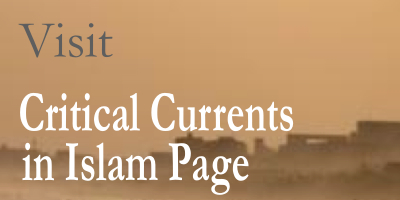Jadaliyya’s Critical Currents in Islam Page engages with a broad range of topics related to Islam as it is interpreted, practiced, and contested in political, cultural, and economic arenas throughout the world. The page is a place for fresh and critical perspectives on many of the issues that have defined internal discussions within Muslim majority societies and a space for highlighting new directions and discussions. Comments and contributions are welcome at cci@jadaliyya.com.
CCI poses important questions about what makes movements and practices “Islamic,” and critically deconstructs the notion of an eternal, unchanging religion. With this in mind, we also seek to highlight the variation and nuances of these Islamic movements and practices as they occur within communities across the globe.
Our geography is not limited to the Middle East. We are mindful of efforts to create “the Muslim world” as a unit of analysis that is often juxtaposed with other units that are not strictly defined according to their religious beliefs and practices (e.g., “the West”). As a result, we encourage efforts to challenge the tendency to essentialize Islamic societies which attribute a cross range of political, social, and cultural views among the global community of Muslims to their religious beliefs. In keeping with Jadaliyya`s broader approach, we are interested in looking at communities on their own terms.
Our goal in designating a space for the study of Islam within Jadaliyya is to examine the ways in which Islam is but one of a multiplicity of factors that interact in the cultivation of political, economic, and sociocultural arrangements, often yielding varied outcomes across the breadth of Islamic societies. It is in that spirit that we are launching with articles that explore how practical political and social considerations interact with personalities, texts and discourses presumed to provide religious authority in order to produce such diverse results.
Religion, Secularism, Sectarianism: CCI’s Broader Framework
CCI operates within a larger framework that Jadaliyya is developing on religion, secularism, and sectarianism. Our interest in Islam extends into the debates surrounding each of these issues within Muslim majority societies. How could it not? After all, Muslim majority societies are also societies with much religious and sectarian diversity. One cannot isolate “Islam” from other religions and spiritual practices that have shaped and informed it. This point becomes crucial when studying Islam as it is lived and practiced within spaces that are always already diverse and always already secular due to the hegemonic structure of the nation state and the governmentalization of religion and sectarianism - technologies of secular state power. CCI encourages an approach that is at once critical of attempts to marginalize voices that find empowerment through religious expression, while simultaneously shedding light on instances of religion as a hegemonic force in Islamic societies.
A major goal of CCI is to disentangle foundational principles in the study of Islam, which suffered the same fate as the study of religion generally as an entity that exists outside of the modern nation state. Modernization Theory (and its secularization corollary) has long been challenged by leading scholars, especially those who specialize in the study of Muslim-majority societies. However, it continues to manifest in publications such as the UN Arab Human Development Report and similar studies which recommend modernization policies and economic development as a solution to the “problem” of religiously-inspired activism and resistance. It is therefore no coincidence that the question of Islam and the modern state is a recurring theme in several of our launch pieces.
We also take a distinctive approach towards women. There is an expectation and indeed tendency for any discussion of Islam to speak to the category of “women in Islam.” We avoid this formulation because just as we see Islam as a fluid category that people understand, articulate, and practice in a variety of ways, so too we attend to women’s experiences of Islam as nuanced, diverse, and dynamic. We regard men and women`s experiences, and the shaping of gender and sexuality as inextricable from more categories such as politics, economics, and the social. We approach the study of gender, not as a stand-in for the study of women, but rather as crucial category of analysis that is central to our analysis.
Finally, in recognizing the dearth of resources for teaching about Islam, CCI also places an emphasis on offering pedagogical content for educators and welcome queries and suggestions. This content will engage with Islam at a variety of levels, from formation and expansion to internal scholarly debates to contemporary communities’ practices and subjectivities.
Inaugural Articles of the Critical Currents in Islam Page
- Scholarly Roundtable on The Future of Islamism: A Starting Point
- Weaving Ethical Concerns and Aesthetic Aspirations: Fatwas and Nose Jobs in Iran
- The Rise and Fall of the Salafi al-Nour Party in Egypt
- New Texts Out Now: Asef Bayat, Post-Islamism: The Changing Faces of Political Islam
- Critical Currents in Islam Media Roundup (November 12)
- Maroc, difficile dialogue entre islamistes et gauche radicale
- Profile: Mohammad Arkoun
In keeping with this page`s broader framework on "Religion, Secularism, Sectarianism," we are also announcing a partnership between faculty and graduate students from the University of California and Jadaliyya with the aim of generating innovative forms of public knowledge and intellectual exchange. Our inaugural post in this partnership introduces the research project and begins to think through the ways that sexuality, religion, and secularity come together in the management of citizenship.
